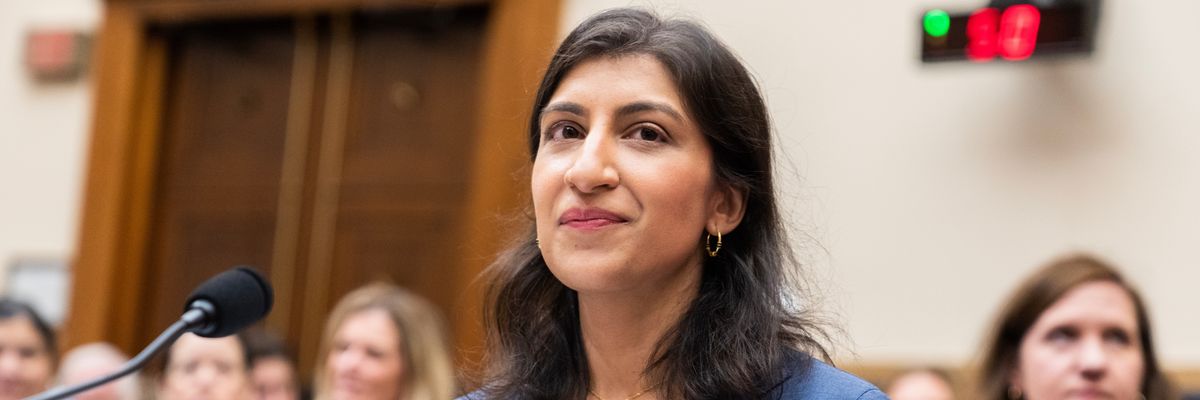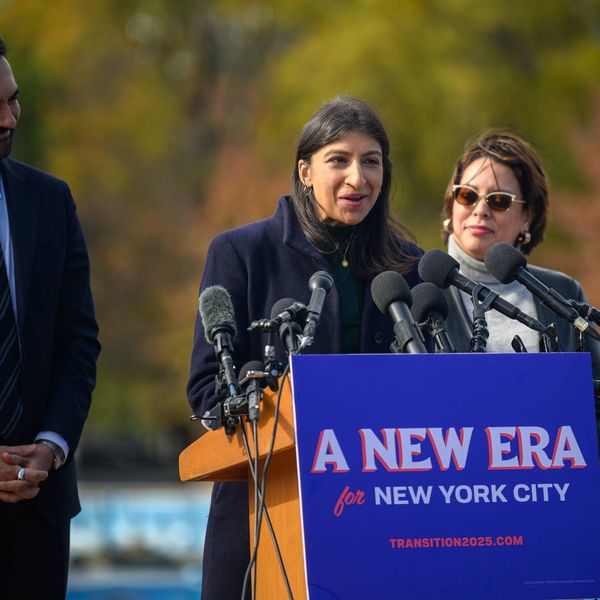
FTC Chair Lina Khan prepares to testify during a House Judiciary Committee hearing on July 13, 2023.
New FTC 'Click-to-Cancel' Rule Marks Latest Pro-Consumer Win by Lina Khan
"Consumers shouldn't have to navigate a Rube Goldberg machine to get out of a subscription they purchased with a keystroke," said one advocate.
The target of the latest consumer protection rule unveiled by the Biden-Harris administration's Federal Trade Commission on Wednesday is, as one journalist said, "one of those things that sounds minor but is at the heart of many of the frustrations of American life": The hoops people in the U.S. are required to jump through to cancel subscriptions or services they no longer want or need.
The FTC announced that its "click-to-cancel" rule, part of the agency's review of the 1973 Negative Option Rule, was finalized and will go into effect 180 days after it is published in the Federal Register.
Under the rule, sellers will be required to "make it as easy for consumers to cancel their enrollment as it was to sign up," said the FTC.
Negative option marketing, which allows sellers to interpret a customer's failure to take a specific action as an acceptance of an offer, "can be convenient for sellers and consumers," said the FTC. But the number of complaints the commission has received about subscriptions that are difficult to cancel "has been steadily increasing over the past five years and in 2024 the commission received nearly 70 consumer complaints per day on average, up from 42 per day in 2021."
FTC Chair Lina Khan, who has been applauded by progressives for taking on corporate greed and monopolies, said the FTC aims to end "tricks and traps, saving Americans time and money."
"Too often, businesses make people jump through endless hoops just to cancel a subscription," said Khan. "Nobody should be stuck paying for a service they no longer want."
Advocacy group Demand Progress said the click-to-cancel rule is an example of the kind of action that has made Khan a target of billionaire donors who have lobbied for the chair to be replaced by Vice President Kamala Harris if she wins the November election—and of why voters should push for Khan to remain at the helm of the FTC.
"When Big Tech and Big Business billionaires attack Lina Khan and the FTC, they are attacking commonsense consumer protections like the 'click to cancel' rule," said Emily Peterson-Cassin, director of corporate power at the Demand Progress Education Fund. "On one side, you have Lina Khan and the FTC taking action to stop companies from harassing and confusing consumers into paying for subscriptions they don't want. On the other side, you have billionaire CEOs trying to stop the FTC's work to empower consumers."
Thanks to Khan, said Lindsay Owens, executive director of the Groundwork Collaborative, the rule "will put a stop to [corporations'] predatory pricing model, saving consumers time and money."
"Companies are no longer content to overcharge you just once. Now they are deploying deceptive subscription models to overcharge you as many times as they can for as long as they can," said Owens. "Consumers shouldn't have to navigate a Rube Goldberg machine to get out of a subscription they purchased with a keystroke."
David Dayen, executive editor of The American Prospect, noted that Republican FTC Commissioner Melissa Holyoak claimed the rule was taking effect too quickly—even though it was first proposed 19 months ago.
"Incredible that this was a 3-2 vote," said Dayen. "Republicans on the FTC think it should be hard to cancel subscriptions."
A poll by Data for Progress in August found that 83% of voters support the click-to-cancel rule.
"Corporations were taking our money, we didn't want them to, and we couldn't stop them," said Helaine Olen, managing editor at the American Economic Liberties Project. "Now we can."
An Urgent Message From Our Co-Founder
Dear Common Dreams reader, The U.S. is on a fast track to authoritarianism like nothing I've ever seen. Meanwhile, corporate news outlets are utterly capitulating to Trump, twisting their coverage to avoid drawing his ire while lining up to stuff cash in his pockets. That's why I believe that Common Dreams is doing the best and most consequential reporting that we've ever done. Our small but mighty team is a progressive reporting powerhouse, covering the news every day that the corporate media never will. Our mission has always been simple: To inform. To inspire. And to ignite change for the common good. Now here's the key piece that I want all our readers to understand: None of this would be possible without your financial support. That's not just some fundraising cliche. It's the absolute and literal truth. We don't accept corporate advertising and never will. We don't have a paywall because we don't think people should be blocked from critical news based on their ability to pay. Everything we do is funded by the donations of readers like you. Will you donate now to help power the nonprofit, independent reporting of Common Dreams? Thank you for being a vital member of our community. Together, we can keep independent journalism alive when it’s needed most. - Craig Brown, Co-founder |
The target of the latest consumer protection rule unveiled by the Biden-Harris administration's Federal Trade Commission on Wednesday is, as one journalist said, "one of those things that sounds minor but is at the heart of many of the frustrations of American life": The hoops people in the U.S. are required to jump through to cancel subscriptions or services they no longer want or need.
The FTC announced that its "click-to-cancel" rule, part of the agency's review of the 1973 Negative Option Rule, was finalized and will go into effect 180 days after it is published in the Federal Register.
Under the rule, sellers will be required to "make it as easy for consumers to cancel their enrollment as it was to sign up," said the FTC.
Negative option marketing, which allows sellers to interpret a customer's failure to take a specific action as an acceptance of an offer, "can be convenient for sellers and consumers," said the FTC. But the number of complaints the commission has received about subscriptions that are difficult to cancel "has been steadily increasing over the past five years and in 2024 the commission received nearly 70 consumer complaints per day on average, up from 42 per day in 2021."
FTC Chair Lina Khan, who has been applauded by progressives for taking on corporate greed and monopolies, said the FTC aims to end "tricks and traps, saving Americans time and money."
"Too often, businesses make people jump through endless hoops just to cancel a subscription," said Khan. "Nobody should be stuck paying for a service they no longer want."
Advocacy group Demand Progress said the click-to-cancel rule is an example of the kind of action that has made Khan a target of billionaire donors who have lobbied for the chair to be replaced by Vice President Kamala Harris if she wins the November election—and of why voters should push for Khan to remain at the helm of the FTC.
"When Big Tech and Big Business billionaires attack Lina Khan and the FTC, they are attacking commonsense consumer protections like the 'click to cancel' rule," said Emily Peterson-Cassin, director of corporate power at the Demand Progress Education Fund. "On one side, you have Lina Khan and the FTC taking action to stop companies from harassing and confusing consumers into paying for subscriptions they don't want. On the other side, you have billionaire CEOs trying to stop the FTC's work to empower consumers."
Thanks to Khan, said Lindsay Owens, executive director of the Groundwork Collaborative, the rule "will put a stop to [corporations'] predatory pricing model, saving consumers time and money."
"Companies are no longer content to overcharge you just once. Now they are deploying deceptive subscription models to overcharge you as many times as they can for as long as they can," said Owens. "Consumers shouldn't have to navigate a Rube Goldberg machine to get out of a subscription they purchased with a keystroke."
David Dayen, executive editor of The American Prospect, noted that Republican FTC Commissioner Melissa Holyoak claimed the rule was taking effect too quickly—even though it was first proposed 19 months ago.
"Incredible that this was a 3-2 vote," said Dayen. "Republicans on the FTC think it should be hard to cancel subscriptions."
A poll by Data for Progress in August found that 83% of voters support the click-to-cancel rule.
"Corporations were taking our money, we didn't want them to, and we couldn't stop them," said Helaine Olen, managing editor at the American Economic Liberties Project. "Now we can."
- 'Mark Cuban Is Wrong': Bernie Sanders Defends Lina Khan as 'Best FTC Chair in Modern History' ›
- 'A Big Deal': Progressives Applaud New Biden Plan to Provide Student Debt Relief for Millions ›
- To Protect Consumers, Biden Cracks Down on 'Corporate Tricks' Like Hard-To-Cancel Services ›
- With Defeat of Megamerger, Sanders Thanks Khan for Taking On 'Corporate Greed' | Common Dreams ›
The target of the latest consumer protection rule unveiled by the Biden-Harris administration's Federal Trade Commission on Wednesday is, as one journalist said, "one of those things that sounds minor but is at the heart of many of the frustrations of American life": The hoops people in the U.S. are required to jump through to cancel subscriptions or services they no longer want or need.
The FTC announced that its "click-to-cancel" rule, part of the agency's review of the 1973 Negative Option Rule, was finalized and will go into effect 180 days after it is published in the Federal Register.
Under the rule, sellers will be required to "make it as easy for consumers to cancel their enrollment as it was to sign up," said the FTC.
Negative option marketing, which allows sellers to interpret a customer's failure to take a specific action as an acceptance of an offer, "can be convenient for sellers and consumers," said the FTC. But the number of complaints the commission has received about subscriptions that are difficult to cancel "has been steadily increasing over the past five years and in 2024 the commission received nearly 70 consumer complaints per day on average, up from 42 per day in 2021."
FTC Chair Lina Khan, who has been applauded by progressives for taking on corporate greed and monopolies, said the FTC aims to end "tricks and traps, saving Americans time and money."
"Too often, businesses make people jump through endless hoops just to cancel a subscription," said Khan. "Nobody should be stuck paying for a service they no longer want."
Advocacy group Demand Progress said the click-to-cancel rule is an example of the kind of action that has made Khan a target of billionaire donors who have lobbied for the chair to be replaced by Vice President Kamala Harris if she wins the November election—and of why voters should push for Khan to remain at the helm of the FTC.
"When Big Tech and Big Business billionaires attack Lina Khan and the FTC, they are attacking commonsense consumer protections like the 'click to cancel' rule," said Emily Peterson-Cassin, director of corporate power at the Demand Progress Education Fund. "On one side, you have Lina Khan and the FTC taking action to stop companies from harassing and confusing consumers into paying for subscriptions they don't want. On the other side, you have billionaire CEOs trying to stop the FTC's work to empower consumers."
Thanks to Khan, said Lindsay Owens, executive director of the Groundwork Collaborative, the rule "will put a stop to [corporations'] predatory pricing model, saving consumers time and money."
"Companies are no longer content to overcharge you just once. Now they are deploying deceptive subscription models to overcharge you as many times as they can for as long as they can," said Owens. "Consumers shouldn't have to navigate a Rube Goldberg machine to get out of a subscription they purchased with a keystroke."
David Dayen, executive editor of The American Prospect, noted that Republican FTC Commissioner Melissa Holyoak claimed the rule was taking effect too quickly—even though it was first proposed 19 months ago.
"Incredible that this was a 3-2 vote," said Dayen. "Republicans on the FTC think it should be hard to cancel subscriptions."
A poll by Data for Progress in August found that 83% of voters support the click-to-cancel rule.
"Corporations were taking our money, we didn't want them to, and we couldn't stop them," said Helaine Olen, managing editor at the American Economic Liberties Project. "Now we can."
- 'Mark Cuban Is Wrong': Bernie Sanders Defends Lina Khan as 'Best FTC Chair in Modern History' ›
- 'A Big Deal': Progressives Applaud New Biden Plan to Provide Student Debt Relief for Millions ›
- To Protect Consumers, Biden Cracks Down on 'Corporate Tricks' Like Hard-To-Cancel Services ›
- With Defeat of Megamerger, Sanders Thanks Khan for Taking On 'Corporate Greed' | Common Dreams ›

